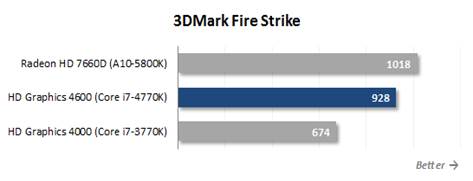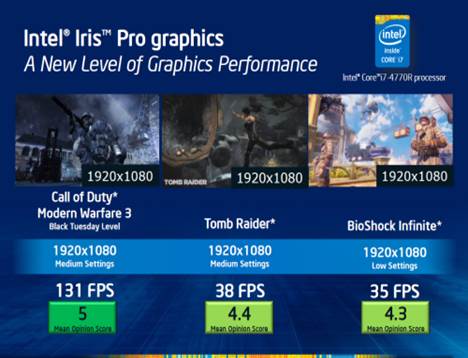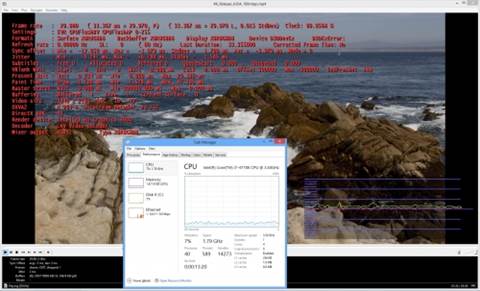Performance
of Intel HD Graphics 4600
Well, it looks like Intel doesn’t really
bother about the integrated graphics capabilities of its desktop CPUs. At least
they do not have the fastest version of that core. Even the top-of-the-line
Core i7-4770K is only endowed with the midrange GT2 version which is officially
referred to as Intel HD Graphics 4600.
Haswell desktops do not provide any
enhancement in terms of regular computing. Its improvement actually does not
promise anything like that, instead of creating the power saving mode for the
Core microarchitecture and perfecting 3D graphics performance. While Haswell
CPUs’ TDP levels are just some watts, which is very hard to encourage the desktop
users, innovations in graphics are considerable. AMD has managed to build a
market for the APU and Intel desktop solutions with better computing and
comparable graphics would definitely find their customers.
Well, it looks like Intel does not really care
about the integrated graphics capabilities of the desktops CPUs. At least the
fastest version of that core does not belong to them. Even the senior Core i7
4770K is just endowed with the midrange GT2 version which is called Intel HD
Graphics 4600.

TechPowerUp
GPU
Anyway, even this graphics core does bring
the improved performance compared to HD Graphics 4000 that usually see with the
senior Ivy Bridge CPUs. First of all, the number of execution devices increases
from 16 to 20. The performance of most of the fixed-function pixel processing
units is doubled while the texture samplers are four times as fast as before.

Haswell
microarchitecture
The clock rate has been increased. HD
Graphics 4000 works at the frequency of 1.15 GHz in Core i7-3770K while the new
HD Graphics 4600 works at 1.25 GHz in Core i7-4770K. All of these things
emphasize the considerable performance benefits which can be estimated by
3DMark 11 and the latest benchmark 3DMark Cloud Gate. By this way, HD Graphics
4600 has no problem running contemporary games and standards as it supports all
of modern API: DirectX 11.1, OpenGL 4.0 and OpenCL 1.2.

3DMark
11

3DMark
Fire Strike
Although the number of executing devices in
HD Graphics 4600 just increases one fourth more than its predecessor, it is
very different in speed. Haswell graphics core is nearly doubled compared to
previous version in 3DMark 11 while the 3DMark Fire Strike reveals that the
Core i7 4770K is almost 40% better than its predecessor. In both cases, that is
enough for Haswell desktops to be comparable with the premium AMD Trinity APU
in terms of 3D performance.
Luckily for AMD, Intel does not provide any
plan to enhance the graphics to be faster than the GT3 core in desktop segment.
The only version of Intel CPU for desktops which has better graphics
capabilities is the BGA-packaged R series. Therefore, AMD does not have to
worry about the position of APU in the market, although Intel has been
progressing steadily in this segment.
The results of the synthetic tests from
Futuremark need to be added with what the graphics cores are able to do in
practical games. There are two testing modes: Full HD resolution (1,920x1,080)
with low-quality image settings and resolution of 1366x768 with average image
settings.

Metro:
Last light, 1366x768 MQ

Metro:
Last light, 1920 x 1080 LQ

F12012,
1366 x 768 HQ

F1
2012, 1920 x 1080 MQ

Tomb
Raider, 1366 x 768 MQ

Tomb
Raider: 1920 x 1080 LQ

Hitman:
Absolution, 1366 x 768 MQ

Hitman:
Absolution, 1920 x 1080 LQ
The gap between HD Graphics 4600 and HD
Graphics 400 is not as much as what showed in the synthetic standard. Considering
it on average, Core i7 4770K is 25 – 30% ahead of the senior Ivy Bridge, which
is not enough to provide the user with the newest games at the resolution of
Full HD, even when the images are set at low quality. In other words, HD
Graphics 4600 is hard to be considered as a junior game solution. The fastest
GT3 graphics core must have that ability, so Intel, when mentioning it, not
only claims about its amount (5100) but also its quite good name Iris.

Intel
Iris Pro graphics
Besides 3D features, Intel graphics core
comes with a dedicated multi-media tool which is called Quick Sync Tech. Haswell
features the new formats (SVC and Motion JPEG), new image enhancement
techniques (for example hardware image stabilization and frame rate conversion),
video cryptographic with the resolution up to 4096 x 2304 pixel, … It promises
to transcode faster and we can easily check for that.
We use CyberLink Media Espresso 6.7 utility
for that purpose because it is optimized for Intel Quick Sync as well as other
cryptographic abilities of other contemporary CPU and GPU. Although Intel has
published its SDK to access the hardware coder / CPU Core’s decoder, free
applications developers are not rushed to implement the support the Quick Sync
Tech in their solutions, so we have to use the paid utility from CyberLink.
For the transcode tests, we use a 40-minute
1080p video which is in H.264 format with about 10 Mbit/s bit rate and low
resolution to view on a iPhone 4S. H.264, resolution 1,280x720 with 6 Mbit/s
bitrate is the target video format.

Testing
the graphics performance
Haswell’s upgraded media function is about
40% faster and the transcoding quality is also well improved, which can be
recognized easily even when you convert videos for mobile devices. The
following images give you the clearer view on videos compressed by Ivy and
other media tools of Haswell when the settings are similar (6 Mbps bitrate for iPhone
4S).

Testing
graphics performance
It is quite easy to realize that Intel
Quick Sync of Haswell ensures better detail level for small objects, and the
color tone is also more natural.
Haswell’s graphics core reacts wonderfully
with hardware acceleration ability of video playback at resolution of 4K. For
example, we will check how high the use of CPU increases in a system which is
based on core i7 4770K, using to watch a special video which is prepared to be
in the H.264 format, at the resolution of 3840 x 2160 with 103 Mbit/s bitrate.

Evaluating
graphics performance
There is no problem occurring when using
Intel HD Graphics 4600 core. There is no fringing and the use of CPU does not
exceed 10%. Moreover, processor computational cores are even still in the power
saving modes: their frequencies are really different from the nominal parameter
of 3.5 GHz. In other words, Haswell has been well equipped to work with video
4K.